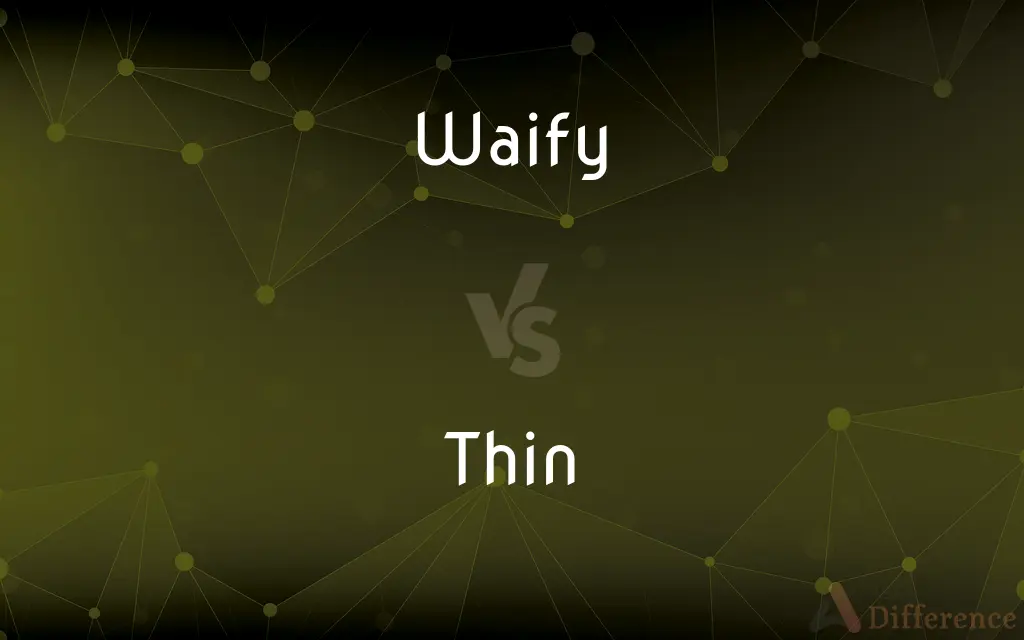Waify vs. Thin — What's the Difference?
By Fiza Rafique & Urooj Arif — Updated on April 26, 2024
Waify describes a fragile, delicate appearance, often suggesting undernourishment, while thin simply refers to having little fat or excess flesh, not necessarily implying frailty.

Difference Between Waify and Thin
Table of Contents
ADVERTISEMENT
Key Differences
Waify implies a certain delicateness and fragility, often associated with an ethereal, almost insubstantial quality, suggesting someone may look as if they need more nourishment. Whereas thin describes a body type that is slender and has less body fat, without necessarily implying any health issues or frailty.
The term waify often carries connotations of vulnerability and a need for protection, portraying a person as almost ghost-like in their delicacy. On the other hand, being thin can be viewed neutrally or even positively, especially in cultures that favor slimness, and does not suggest weakness or fragility.
Waify is not a commonly used term in everyday language and might be found more in literary or descriptive contexts to evoke a specific, poignant image. Whereas thin is a straightforward, commonly used adjective that applies to various subjects, from body shape to material dimensions.
People described as waify might also be perceived as being in need of care, underscoring a sense of inadequacy in physical health or strength. Thin people, however, might simply be seen as fit or in good physical condition, depending on the context.
In visual media, a waify character might be styled to emphasize their ethereal qualities, such as in fashion photography or film, to create a dramatic effect. On the other hand, thin characters or models might be presented in a variety of ways, ranging from healthy to glamorous, without the implied drama of fragility.
ADVERTISEMENT
Comparison Chart
Connotation
Fragile, delicate, needing care
Simply low body fat, not implying health
Usage Frequency
Less common, more literary
Common, used in everyday language
Implied Health
Implies undernourishment, possible health concerns
Does not imply health issues, can be neutral or positive
Cultural Perception
Often seen as needing protection, can be pitied
Generally neutral, sometimes admired depending on context
Visual Representation
Often stylized to emphasize delicacy in arts and fashion
Varied, from everyday appearances to health and fitness models
Compare with Definitions
Waify
Suggestive of vulnerability or neediness.
The waify child in the movie evoked strong emotions from the audience.
Thin
Lacking in richness or strength; weak.
The soup tasted thin and lacked flavor.
Waify
Light and insubstantial in appearance.
He wore a waify scarf that seemed almost transparent.
Thin
Sparse in amount or frequency.
His thin hair was carefully combed to cover the bald spot.
Waify
Resembling a waif; appearing thin and fragile.
The artist's muse had a waify silhouette, almost like a figure from a fairy tale.
Thin
Having little to no excess flesh or fat; slender.
She admired her thin figure in the mirror.
Waify
Having an ethereal and delicate quality.
Her waify presence gave her performances an otherworldly quality.
Thin
Not dense or crowded.
The thin crowd at the concert made it easy to find a good spot.
Waify
Characterized by an appearance of malnourishment.
The stray cat looked waify and desperately needed care.
Thin
Fine or slender in thickness or structure.
She wore a thin bracelet made of delicate silver threads.
Waify
Characteristic of a waif; thin; waifish.
She has a very waify frame.
Thin
With opposite surfaces or sides that are close or relatively close together
A thin line of paint
Thin slices of bread
Thin
Having little, or too little, flesh or fat on the body
A thin, gawky adolescent
Thin
Having few parts or members relative to the area covered or filled; sparse
A depressingly thin crowd
His hair was going thin
Thin
(of a liquid substance) not containing much solid; flowing freely
Thin soup
Thin
Lacking substance or quality; weak or inadequate
The evidence is rather thin
Thin
With little thickness or depth
A thin-sliced loaf
Cut the ham as thin as possible
Thin
Make or become less dense, crowded, or numerous
The trees began to thin out
The remorseless fire of archers thinned their ranks
Thin
Make or become smaller in thickness
Their effect in thinning the ozone layer is probably slowing the global warming trend
Thin
Hit (a ball) above its centre.
Thin
Relatively small in extent from one surface to the opposite, usually in the smallest solid dimension
A thin book.
Thin
Not great in diameter or cross section; fine
Thin wire.
Thin
Having little bodily flesh or fat; lean or slender.
Thin
Not dense or concentrated; sparse
The thin vegetation of the plateau.
Thin
More rarefied than normal
Thin air.
Thin
Flowing with relative ease; not viscous
A thin oil.
Thin
Watery
Thin soup.
Thin
Sparsely supplied or provided; scanty
A thin menu.
Thin
Having a low number of transactions
Thin trading in the stock market.
Thin
Lacking force or substance; flimsy
A thin attempt.
Thin
Lacking resonance or fullness; tinny
The piano had a thin sound.
Thin
Lacking radiance or intensity
Thin light.
Thin
Not having enough photographic density or contrast to make satisfactory prints. Used of a negative.
Thin
In a thin manner
Spread the varnish thin if you don't want it to wrinkle.
Thin
So as to be thin
Cut the cheese thin.
Thin
To make or become thin or thinner.
Thin
Having little thickness or extent from one surface to its opposite.
Thin plate of metal;
Thin paper;
Thin board;
Thin covering
Thin
Very narrow in all diameters; having a cross section that is small in all directions.
Thin wire;
Thin string
Thin
Having little body fat or flesh; slim; slender; lean; gaunt.
Thin person
Thin
Of low viscosity or low specific gravity.
Water is thinner than honey.
Thin
Scarce; not close, crowded, or numerous; not filling the space.
The trees of a forest are thin; the corn or grass is thin.
Thin
(golf) Describing a poorly played golf shot where the ball is struck by the bottom part of the club head. See fat, shank, toe.
Thin
Lacking body or volume; small; feeble; not full.
Thin
Slight; small; slender; flimsy; superficial; inadequate; not sufficient for a covering.
A thin disguise
Thin
(aviation) Of a route: relatively little used.
Thin
Poor; scanty; without money or success.
Thin
(philately) A loss or tearing of paper from the back of a stamp, although not sufficient to create a complete hole.
Thin
Any food produced or served in thin slices.
Chocolate mint thins
Potato thins
Wheat thins
Thin
(transitive) To make thin or thinner.
Thin
(intransitive) To become thin or thinner.
The crowds thinned after the procession had passed: there was nothing more to see.
Thin
To dilute.
Thin
To remove some plants or parts of plants in order to improve the growth of what remains.
Thin
Not thickly or closely; in a scattered state.
Seed sown thin
Thin
Having little thickness or extent from one surface to its opposite; as, a thin plate of metal; thin paper; a thin board; a thin covering.
Thin
Rare; not dense or thick; - applied to fluids or soft mixtures; as, thin blood; thin broth; thin air.
In the day, when the air is more thin.
Satan, bowing lowHis gray dissimulation, disappeared,Into thin air diffused.
Thin
Not close; not crowded; not filling the space; not having the individuals of which the thing is composed in a close or compact state; hence, not abundant; as, the trees of a forest are thin; the corn or grass is thin.
Ferrara is very large, but extremely thin of people.
Thin
Not full or well grown; wanting in plumpness.
Seven thin ears . . . blasted with the east wind.
Thin
Not stout; slim; slender; lean; gaunt; as, a person becomes thin by disease.
Thin
Wanting in body or volume; small; feeble; not full.
Thin, hollow sounds, and lamentable screams.
Thin
Slight; small; slender; flimsy; wanting substance or depth or force; superficial; inadequate; not sufficient for a covering; as, a thin disguise.
My tale is done, for my wit is but thin.
Thin
Not thickly or closely; in a seattered state; as, seed sown thin.
Spain is thin sown of people.
Thin
To make thin (in any of the senses of the adjective).
Thin
To grow or become thin; - used with some adverbs, as out, away, etc.; as, geological strata thin out, i. e., gradually diminish in thickness until they disappear.
Thin
Lose thickness; become thin or thinner
Thin
Make thin or thinner;
Thin the solution
Thin
Lessen the strength or flavor of a solution or mixture;
Cut bourbon
Thin
Take off weight
Thin
Of relatively small extent from one surface to the opposite or in cross section;
Thin wire
A thin chiffon blouse
A thin book
A thin layer of paint
Thin
Lacking excess flesh;
You can't be too rich or too thin
Yon Cassius has a lean and hungry look
Thin
Very narrow;
A thin line across the page
Thin
Having little substance or significance;
A flimsy excuse
Slight evidence
A tenuous argument
A thin plot
Thin
Not dense;
A thin beard
Trees were sparse
Thin
Relatively thin in consistency or low in density; not viscous;
Air is thin at high altitudes
A thin soup
Skimmed milk is much thinner than whole milk
Thin oil
Thin
(of sound) lacking resonance or volume;
A thin feeble cry
Thin
Lacking spirit or sincere effort;
A thin smile
Thin
Without viscosity;
The blood was flowing thin
Common Curiosities
Can men be described as waify?
Yes, men can be described as waify if they have a particularly delicate and fragile appearance.
What is the difference between thin and skinny?
Thin is a more neutral term, while skinny often carries connotations of being excessively thin.
Does 'waify' imply health issues?
Waify often implies health concerns such as undernourishment or fragility, though it's primarily used descriptively rather than medically.
How does the fashion industry view waify vs. thin?
The fashion industry may use both terms but waify often evokes a more specific, delicate aesthetic compared to the generally desirable attribute of being thin.
Can children be described as thin in the same way as adults?
Yes, children can be described as thin, but typically in reference to their physique rather than their health, unless specified.
Is being described as thin negative?
Being described as thin is not inherently negative; it can be neutral or positive depending on the context.
Are there any positive implications of being waify?
In some artistic contexts, being waify can be seen as romantically ethereal or otherworldly, which may be viewed positively.
Can the term 'waify' be considered pejorative?
Depending on the context, 'waify' can be seen as pejorative if it emphasizes vulnerability or weakness excessively.
What does waify mean?
Waify refers to someone who appears very delicate, often suggesting a need for care or nourishment.
What should be considered when describing someone as thin?
When describing someone as thin, it's important to consider the context and potential sensitivity surrounding body image issues.
Is it common to use 'waify' in everyday conversation?
'Waify' is not commonly used in everyday conversation; it's more likely to appear in artistic or literary contexts.
Is 'thin' always related to body image?
While often related to body image, 'thin' can also describe objects (like a thin book) or qualities (like a thin argument).
How do media portrayals differ when showing waify versus thin characters?
Media often portrays waify characters with a sense of vulnerability or etherealness, whereas thin characters might be shown as fit, healthy, or fashionable.
How does public perception differ between waify and thin?
Public perception often views 'waify' as more specific and loaded with subtle implications of fragility, while 'thin' is more broadly and neutrally applied.
What kinds of clothes might suit a waify figure?
Light, flowing garments that emphasize delicacy and fragility are often styled to complement a waify figure.
Share Your Discovery

Previous Comparison
Laugh vs. Giggle
Next Comparison
Skittles vs. BowlingAuthor Spotlight
Written by
Fiza RafiqueFiza Rafique is a skilled content writer at AskDifference.com, where she meticulously refines and enhances written pieces. Drawing from her vast editorial expertise, Fiza ensures clarity, accuracy, and precision in every article. Passionate about language, she continually seeks to elevate the quality of content for readers worldwide.
Co-written by
Urooj ArifUrooj is a skilled content writer at Ask Difference, known for her exceptional ability to simplify complex topics into engaging and informative content. With a passion for research and a flair for clear, concise writing, she consistently delivers articles that resonate with our diverse audience.
















































